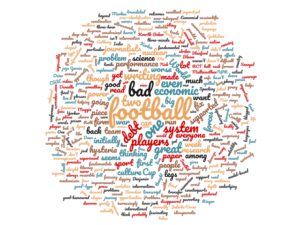Hi all,
I am not a football fan. I used to watch a lot, and even went to the World Cup in 2010 (though it was only a three-hour plane journey for me back then). But gradually, two forces drove me away from the sport: hysteria and over-exposure. The hysteria was a problem among both fans and journalists: among the former, it was increasingly difficult to have a conversation about the sport that didn’t descend into ‘two legs bad, four legs good’-type parroting. Among journalists it was even worse: a good goal made a player a genius, and a bad performance made a team a disgrace to the nation, when the average was normally true: they were… alright. And overexposure meant that one of the great joys of international football, seeing players you had never heard of run rings around their more famous counterparts has disappeared: there are scouting videos out there of players so young that they resemble ultrasounds. In other words, bah, humbug.
1. So what do you read about the World Cup if you don’t want to live through the relentless volatility and knee-jerk idiocy of the British football press? One big problem in most football writing is ‘over-identification’, where pundits over-interpret every piece of information that precedes the final outcome, using them to explain it even when most of them were ‘noise’ that had no causal importance. So, proceed over to 538, where they are running a model-based prediction system for the games, which helps you think about what the underlying mechanisms are, and what is idiosyncratic about each result. If your care more about what makes a country great at football, the Economist ran an excellent deep-dive that goes beyond football: “In Senegal, coaches have to deworm and feed some players before they can train them…”. And if you want good-humoured but unscientific coverage that takes pop culture seriously, read The Ringer.
2. On to matters that actually are as important as life and death. Markus Goldstein covers the Pam Jakiela/Owen Ozier paper about how ‘gendered’ languages translated into worse outcomes for women that I blogged about for the CSAE conference here, going to much greater depth about the actual size and type of effects they find. The extent to which language shapes culture or is shaped by it (or some complex and probably impossible to specify combination of the two) is always going to shape responses to this research, but it is fascinating and more policy relevant than it first seems.
3. 538 continues to impress me with its science writing, with Maggie Koerth-Baker this week digging in to why nuclear power is dying out in the US. This strikes me as a very bad thing: nuclear power seems pretty safe, and produces new carbon. Win, I would have thought.
4. Nick Bloom gives a three-minute primer on his research into management interventions in India, focusing on how the intervention both boosted firm performance lastingly and spilled over into other areas of the firm than the one supported initially. He glosses over what for me is the most compelling finding of the paper, though: that other firms that weren’t initially supported neither die out nor learn to implement the good practices themselves. When something as fundamental to the economic world view as the equalising forces of competition has its limits shown, we have a lot of thinking to do.
5. Speaking of the fundamentals of economic thinking: this RCT by Dean Karlan, Benjamin Roth and Sendhil Mullainathan (what a team!) shows that helping people get out of debt or avoid debt through a one of cash transfer or financial literacy support is a temporary fix: they usually fall back into debt. This isn’t surprising to me: when so much of the economic system doesn’t work, you’d expect small improvements not to snowball because there are so many barriers to that. Problems are more reliable and less constrained than opportunities. So problems win out in the longer run, unless you fix that system.
6. Cardiff (Garcia!) and Danielle from NPR on the phony war phase of the US vs. everyone trade war. They point out that the big guns haven’t been fired yet, so the real damage hasn’t been done yet (transcript).
7. This week in bad science: apparently the Stanford prison experiment was juked like hell, and maybe people aren’t just the worst (I can believe the first part, but the second?).
8. And lastly, at the end of a long one: more writing in memoriam of Anthony Bourdain. I really love the New Yorker piece, in which his evolution towards feminism is charted in particular.
Have a great weekend, everyone!
R

